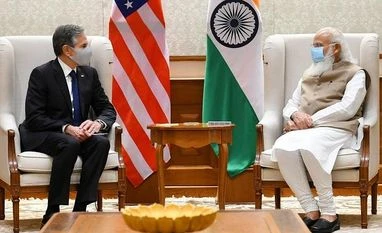India-US strategic partnership will be of even greater global significance in the coming years, with respect to the challenges posed by pandemic, global economic recovery and climate change, Prime Minister Narendra Modi said on Wednesday.
Both nations also share a deep commitment to the values of democracy, freedom and liberty, Modi said at his meeting with the US Secretary of State Antony Blinken, where they discussed efforts to deepen the US-India comprehensive global strategic partnership.
“Secretary Blinken appreciated the increasing convergence between India and US on a wide range of bilateral and multilateral issues, and the commitment of both strategic partners to convert this convergence into concrete and practical cooperation,” the Prime Minister’s office said in a statement.
Separately, the US State Department spokesperson Ned Price in an official statement said that Blinken and Modi discussed regional challenges and a growing range of cooperation on Covid-19 response efforts, climate change, shared values and democratic principles, and regional security, including through Quad consultations that includes the US, Australia, India and Japan.
Blinken is on a two-day visit to India starting Tuesday. He also met External Affairs Minister S Jaishankar as well as the National Security Advisor Ajit Doval, which was followed by a meeting with Modi at this residence.
India and the United States will be leaders in bringing the Covid-19 pandemic to an end, through Quad vaccine partnership that will bring vaccines to other countries across the region, Blinken said.
The Quad group of countries aim to combat the pandemic and explore opportunities for collaboration to provide safe, equitable and affordable vaccines in the Indo-Pacific region.
Both nations will also work together to set up a stronger global health security system in the future, Blinken said in a joint media briefing with Jaishankar.
During his first trip to India, Blinken announced an additional $25 million from the US government, through US Agency for International Development (USAID), to support India’s Covid-19 vaccination program. USAID will partner with the health ministry and state governments, to support vaccine supply chain logistics, address misinformation and vaccine hesitancy, and train healthcare workers to deliver vaccines safely and effectively across India.
In their meeting, Blinken and Jaishankar discussed ways to boost trade and investment between both nations, ways to tackle climate change, relax travel restrictions as well as the situation in Afghanistan.
As far as trade is concerned, Blinken said that both nations will have to work on the barriers that stand in the way of greater bilateral investments and deeper commercial ties. “If we create the right conditions for more trade and investments and innovations, there is no limit to what our private sectors can achieve together,” he said.
“We spoke at length about regional concerns, multilateral institutions and global issues, the expanding Indian footprint, be it in Africa, South-east Asia, Caribbean or the South-pacific has naturally broadened the shared agenda. Among the many issues that we looked at, I would specifically note Afghanistan, the Indo-Pacific and the Gulf. Regarding Afghanistan it is essential that peace negotiations are taken seriously by all parties,” Jaishankar told reporters.
Blinken said that even as the US had withdrawn its forces from Afghanistan, it would remain engaged in the diplomacy of working together to the table for resolution of the conflict in Afghanistan.
Unlock 30+ premium stories daily hand-picked by our editors, across devices on browser and app.
Pick your 5 favourite companies, get a daily email with all news updates on them.
Full access to our intuitive epaper - clip, save, share articles from any device; newspaper archives from 2006.
Preferential invites to Business Standard events.
Curated newsletters on markets, personal finance, policy & politics, start-ups, technology, and more.
)